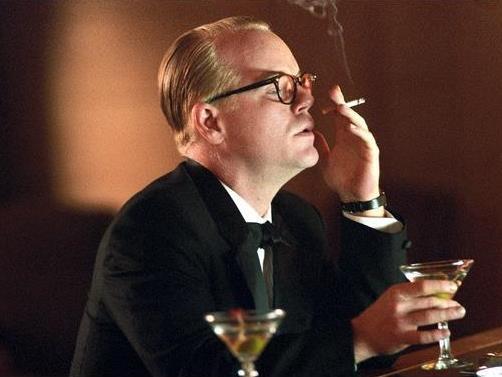Philip Seymour Hoffman’s performance in Capote (2005) won him an Academy Award
Winner of an Academy Award for Best Actor for his performance in Capote, and thrice nominated for a Tony Award for his work on stage (for Death of a Salesman, Long Day’s Journey Into Night and True West), Hoffman was widely regarded as one of the most significant actors of his generation.
In a statement released on Sunday afternoon, Hoffman’s family said, ‘We are devastated by the loss of our beloved Phil and appreciate the outpouring of love and support we have received from everyone. This is a tragic and sudden loss and we ask that you respect our privacy during this time of grieving. Please keep Phil in your thoughts and prayers.’
Tributes to Hoffman flowed in from around the world.
“Sometimes I absolutely hate this job.” — The Grim Reaper, when Philip Seymour Hoffman’s name showed up on his list.
— Patton Oswalt (@pattonoswalt) February 2, 2014
OH NO!!!!! Philip Seymour Hoffman has died. A truly kind, wonderful man and one of our greatest actors – ever
— mia farrow (@MiaFarrow) February 2, 2014
Dear Philip, a beautiful beautiful soul. For the most sensitive among us the noise can be too much. Bless your heart. ;^{
— Jim Carrey (@JimCarrey) February 2, 2014
RIP, PSH. You were a friend to Australian theatre and to many of our artists. Your passing will hurt.
— David Berthold (@DavidBerthold) February 2, 2014
We’re shocked and deeply saddened to learn that Philip Seymour Hoffman has died: http://t.co/ACAcfLqxD3
— BAFTA (@BAFTA) February 2, 2014
Hoffman was inspired to become an actor aged 12, after seeing a performance of Arthur Miller’s All My Sons. Thereafter he attended the Theater School at the New York State Summer School of the Arts in 1984, and went on to study at New York University’s Tisch School of the Arts, where he helped found the theatre company the Bullstoi Ensemble before graduating with a Bachelor of Fine Arts in drama in 1989. Soon after graduating, he was treated for drug and alcohol addiction, reputedly staying clean until 2013, when he was again treated for substance abuse issues.
Though sometimes described as a character actor, Hoffman’s great gift was that he could utterly transform himself for every role, whether sympathetic or unsettling.
‘When you watch Phil work, his entire constitution seems to change. He may look like Phil, but there’s something different in his eyes. And that means he’s reconstituted himself from within, willfully rearranging his molecules to become another human being,’ said director Mike Nichols, who had worked with Hoffman on both stage and screen.
Film critic Sarah Ward said, ‘You didn’t just watch a Philip Seymour Hoffman performance, you felt it; his was a talent that left no doubt as to its boldness and brilliance, and also its deft and drive. In small parts, including Scent of a Woman, The Big Lebowski and The Hunger Games: Catching Fire, he surprised and stole scenes. In lead roles, such as Capote and Synecdoche, New York, he dominated with potent but nuanced displays. As part of an ensemble, as perhaps best demonstrated in his five collaborations with director Paul Thomas Anderson (Hard Eight, Boogie Nights, Magnolia, Punch Drunk Love and The Master), he proved striking and unassailable. His voicework, so poignantly used in Mary and Max, moved and motivated.
‘Hoffman’s envious career spanned more than 60 screen credits large and small, his resume littered with films by the best directors as well as gems anchored solely by his presence, but it was his skill in conveying challenging, complicated, conflicted – and always wholly different – characters that will forever remain his legacy. His work was always a gift to watch, and will continue to inspire for generations. That we will never again see him bring someone new to life is a loss that will linger.’
Despite his success as an actor, Hoffman remained ambivalent about his profession.
‘When I saw All My Sons, I was changed — permanently changed — by that experience. It was like a miracle to me. But that deep kind of love comes at a price: for me, acting is torturous, and it’s torturous because you know it’s a beautiful thing. I was young once, and I said, That’s beautiful and I want that. Wanting it is easy, but trying to be great — well, that’s absolutely torturous,’ he said in a 2008 interview with The New York Times.
Hoffman is survived by his partner, Mimi O’Donnell, a costume designer, and three young children, son Cooper, 10, and daughters Tallulah, 7, and Willa, 5.



